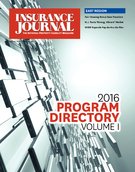Take an industry, say independent insurance agencies, that is supposed to be sales-focused and where principals think accounting is boring. Accounting may be boring but a business owner only ignores it at his or her own peril.
Next, add some fuel to this combustible mix. That fuel is ignorance. Specifically, ignorance of the balance sheet. More pointedly, knowledge of trust monies. The balance sheet is presented first among all financials in audited statements because it is the most important. (Interestingly, insurance is a balance sheet financial tool, not an income statement financial tool and yet the industry pays more attention to the income statement. We should know better. The fact that insurance is a balance sheet tool rather than an income statement tool has been lost on 90 percent-plus of producers and 99 percent of CSRs. This creates a sales problem because the buyer and seller both lack the knowledge of the purpose of insurance.)
Two critical ratios agencies most often miss on the balance sheet are the working capital and trust ratio. Owner after owner dismisses adequacy of working capital to the point of not having any practical understanding of the lack of working capital causes. They always blame the resulting problems on other factors and therefore, they can’t solve the problem because they’re addressing symptoms, not the illness.
The trust ratio (unencumbered cash + premiums receivable – likely bad debt) / (premiums payable) is the most important balance sheet ratio because it tracks whether an agency is spending money that it is supposed to be holding in fiduciary trust for clients and carriers. The ratio must be greater than 1.0, 365 days a year. All states, repeat, all states require agencies hold these monies in a fiduciary capacity. It is a myth that only some states require agencies maintain trust ratios above 1.0. The myth’s origin is the commingling requirement. Most states allow commingling which has resulted in many thinking this means they do not have to maintain adequate trust monies. This is an understandable but completely mistaken assumption.
The problem is much more significant because a large proportion, maybe a majority of balance sheets I see, are materially wrong. The bookkeeper and/or accountant is not putting accounts in the correct categories, long-term loans are constantly listed in the short-term category (and vice-versa), or accounts are ignored year after year, never even being adjusted. Agency owners looking at their balance sheets and calculating their working capital and trust ratios, among other important ratios, will not calculate the right answers in these situations because the data they are using is wrong.
This does not even touch on the issue of the contra premiums receivable and contra premiums payable that are prevalent on agency balance sheets these days. It is impossible, if accounting is properly being measured, to have contra premiums payable and contra premiums receivable. In other words, how can an agency owe more premiums receivable than is owed it every single month and every single year? Simultaneously, how can carriers owe the agency more (this is what contra premiums payable indicate)? This is so ridiculous that many financial people, especially when conducting due diligence, no longer even pay attention to these two accounts. They make their own calculations.
Now add a CPA that does not pay attention or does not know insurance agency accounting. They make accrual to cash adjustments or cash to accrual adjustments that are nonsensical (one cannot adjust trust items because these are fiduciary items not subject to the agency’s income). As one example, the reason insurance agencies using cash accounting can claim bad debt is because the bad debt is for premiums someone did not pay the insurance company thereby affecting fiduciary monies. It is this interaction between fiduciary monies and regular accounting that is so confusing for many. Then add the confusion of earned versus accrual versus cash and one might be lucky to find a CPA even willing to work for the agency.
The last piece is the tax advice so often given by accountants who do not understand that so much of the cash on agencies’ balance sheets does not belong to the agency. It is cash being held in a fiduciary capacity!
The net result is a regulatory and financial mess. I see these messes every week. Sometimes these messes are a result of bad accounting, sometimes bad advice, and sometimes both. Often, no matter how bad the situation, the agency has never been negatively impacted; until the agency is valued or audited.
Until an agency is valued or audited, if the situation does not become too dangerous, most agencies can operate with bad accounting data for years and even decades because it does not always impact the agency’s ability to operate. The agency may not operate optimally or even without pain, but it can operate. However, when it is valued for a sale, a death, a lawsuit, or whatever reason, problematic accounting decreases value and it is just a matter of how much.
Smart buyers will use bad accounting as leverage to decrease the price (“We don’t really know what we are buying because your accounting is poor so we’ll just have to decrease the price.”) The price legitimately must be lower if the trust ratio is less than one and/or if working capital is deficient. The price may have to be lowered if bad accounting has created potential liabilities. At valuation time, bad accounting rarely increases the purchase price.
The solution is this:
- At least gain a basic understanding of accounting, especially specific to insurance agencies. Many agency owners have no accounting background. Take at least a fundamental class.
- Take time to thoroughly educate key people in the agency on the agency management accounting settings, including an understanding of how those settings must work in conjunction with the agency’s procedures. I continually find, so far 99 percent of the time, that when agencies have purchased new agency management systems, inadequate attention (if any attention) has been paid to the accounting settings much less how those settings and procedures must be coordinated. The trainers seem to just skip over this critical step or the agency people working with the trainers do not understand enough to cause the trainers to take the time to explain the options and benefits of the different settings relative to that agency’s procedures. This is a serious issue for accurate accounting and staff efficiency.
- Hire better educated bookkeepers.
- Either train your CPA or get them trained on the extremely unique world of independent insurance agency accounting. I really cannot overemphasize this point.
If you need assistance, let me know. We will help you and your CPA/bookkeeper get the agency’s financial reporting mechanisms in order.
Topics Agencies
Was this article valuable?
Here are more articles you may enjoy.



 Mutual Insurers Chase Rate Adequacy, Financial Strength Remains Strong: AM Best
Mutual Insurers Chase Rate Adequacy, Financial Strength Remains Strong: AM Best  AM Best Downgrades Credit Ratings of Texas Farm Bureau Casualty Insurance Co.
AM Best Downgrades Credit Ratings of Texas Farm Bureau Casualty Insurance Co.  Home Insurance Customers Staying Put Despite More Shopping Around: J.D. Power
Home Insurance Customers Staying Put Despite More Shopping Around: J.D. Power  Appeals Court Spikes Brett Favre’s Defamation Suit Against Shannon Sharpe
Appeals Court Spikes Brett Favre’s Defamation Suit Against Shannon Sharpe 



